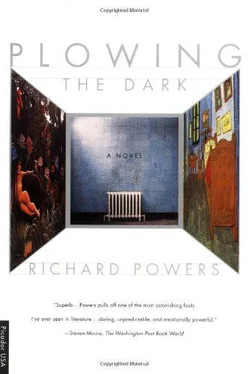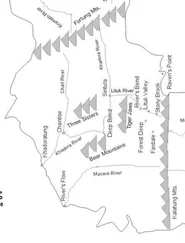That's not how it really is, your mother told anyone who would listen. Above all, her boys. Believe me, the crushed-olive lips begged. But her eyes studied the assaulting broadcasts, flecked with doubt at the distance between what she remembered and this latest round of electronic proof. It's an old country, she insisted, her fleshy face frightened. Older than all this nonsense. Persians were masters of the world back when the Greeks were still in preschool. This, too, will pass, and leave behind nothing but the astonished record.
Because you could not come to it, Iran has come to you. It happily exports Islamic revolution into the vacuum of this fractured country. Your kinsmen bankroll Ali, Walter, the Angry Parent. Your unknown half-ancestor strides out to meet you halfway, in the valley between you.
All through the summer, words come back to you. At meals, or during your half-hour sprints along your oval track, or in the middle of the morning bathroom ritual, now trimmed back to a frenzied seven minutes. Forgotten vocabulary, sometimes in your mother's voice, sometimes in the voice of those grandparents, fictional to you except for two short childhood trips Stateside when the Brits still pumped the oil and the Shah still issued the travel visas. Words return. The names of foods. The primary colors. The numbers from one to ten.
More than words: chunks of your mother's favorite stories, in translation. The one about the white-haired baby who grows up to be a mighty king. The one about a flock of birds who set out to find the fabulous Simurgh. They cross the seven valleys of Journey, Love, Knowing, Detachment, Unity, Bewilderment, and Annihilation, the thirty straggling survivors hanging on just long enough to discover, or rather to remember, that Simurgh means nothing more than "thirty birds."
Your cell is a nave. A ship, a dinghy adrift on the currents of wrecked empire. You lie back in the stern, shackled to your radiator, this room's rudder. Open seas leach you. You drift on the longest day of the year, bobbing near madness, the black overtaking you, infinite time, unfillable, longer even than those childhood nights when your own prison bedroom ran with a dread so palpable that sleep seemed certain death and death far better than this standing terror.
And then that frightened, fleshy face is there, next to yours, laughing in the dark.
What in all the world does a child have to be scared of? The old Persians, your people, called their walls daeza. Pairi meant anything that surrounds. See? Pairi daeza. You have a wall running all the way around you. That, my little Tai-Jan, is the source of Paradise.
At last, deep in winter, the RL team stood and watched the thing that that year had been building toward. It was as if arrival had waited on the cold and dark. Consequence held out for the vesper service, when light ducked below the horizon and inevitability tucked itself in for the evening. The Cavern workers stood by and saw a country unmake itself in one searchlit midnight, teeming with people.
Revelation carried the look of video. Late-night cameras combed the crowd, a mass milling to as many agendas as it had legs. Thick-coated people carried their hastily penned proclamations out into the night, along with their picks and flares and emergency champagne. A stamping winter herd steamed the air with raw breath. Deep in the Standing Now, lost between euphoria and panic, America watched Europe gather for its millennial bash, a decade too soon.
Sooner or later, everyone alive saw this happen, if not live, then on delayed broadcast, if not on archival tape, then in garbled pantomime. Once more the builders of the next world gathered together in the Cavern to witness the end of the previous one. But everything that each of them saw, he saw alone.
A woman who'd devoted her adult life to the religious avoidance of politics, who fled in revulsion from any system bigger than herself, stared in horror at the midnight party. She braced for the tanks again and could not look away. But this time, somehow, the tanks failed
to come.
A man who'd landed in California as an orphaned child, who saw through the sham of identity by the age of seven and thus never bothered to build himself one, looked on the crowd smashing to bits the very stage they danced upon, and thought: My country is next. All boundaries will come down. There will be one Korea, as there was in the beginning. They will find my family, scattered in that chaos. My parents will want me back. I'll return to a home where I've never been.
By spontaneous signal across a medium thinner than air, two warring cities turned out on either half of their barricade. The happy violence gave off the feel of a sporting event — mass disaster tinged with religious awe. By instinct, they poured into the severed Platz, that forty-year-old scar on a continent's heart. A whole generation, raised to believe in this cement fiction, met at the Wall and passed right through it.
Those who couldn't squeeze in to ground zero spilled out along the split. As one, on a silent word, they smashed at the graffitied stone. Chunks flew off, each fossil splinter turning to instant history, shoveled into plastic bags for the overnight souvenir market. The imaginary barricade breached, half the success-stunned sappers foraged east, snapping photographs of a world about to vanish, while the other half streamed west into commercial fairylands, shocked to a standstill by how far shopping's fantasia had advanced in their absence.
The old, mass hallucination came apart at the seams. Cameras sallied out along the salients, soaking up this collective sabotage. A hundred happy souls labored in one residential neighborhood near the Versohnungskirche, undoing the surgical cut that politics had sliced through its narrow-laned heart. Celebration held its breath, terrified with joy. Then it swung into communal destruction, a raucous town barn raising run on rewind.
Along one stretch, the razing snagged on a stuck slab. Worked from both sides, one fifteen-foot-tall block of concrete wobbled on its steel reinforcing rods, flipping lazily in the air like a sheet of damp cardboard. At the far end of a long chord through the Earth's crust, an Armenian mathematician raged against this amateur demolition squad's ham-handedness. He shouted at the video transcription, already hours obsolete. Achl Wunderbar. Brilliant. These are the planet's legendary engineers? The sons of Krupp and Porsche? Would anyone who grasps the basic concept of leverage please step to the front of the mob?
A man half the mathematician's age, nominally Italian, but belonging to no particular nationality except the International Benevolent Order of Programmers, stood by, gawking, as the membrane went permeable. Boyle's law, it seemed to him: the thermocouple yanked to allow free equilibration across that barrier. The aging boy nursed a childhood dream of urban renewal. Blocked-up subway spurs would now be cleared. Traffic could flow rationally, as designed, with all inefficient border checks swept away. Both sides would enjoy a windfall peace dividend, not to mention the beauty of simplification.
In a sorry excuse for a neighborhood local, a Belfast emigrant raised half a glass to the television above the bar, where an ecstatic battalion of barbed-wire cutters danced an allemande on top of their taken objective. Best of luck to you, poor buggers. Reached the promised land, have you?
He mimed a virtual glass-clink and sipped, a good-sport attempt to join in history's graduation party. He toasted the end of the lifelong war, the end of status quo brinksmanship, the end of the market's last alternative, the end of mutually assured destruction, of gunpoint-guaranteed safety. He toasted the end of willed divisions. He toasted the New World Order, the beginning of nuclear proliferation, the steady slide into universal factionalism, the fragmentation past any ability of power politics to control… As he tipped his glass, the onscreen revelers waved their spilling magnums to toast the Irishman back.
Читать дальше












